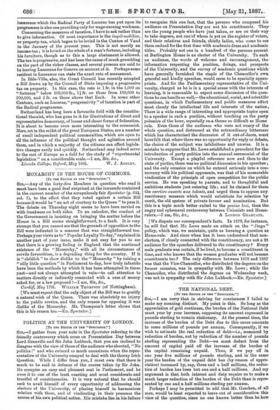• MONARCHY IN THE HOUSE OF COMMONS. [To TEN Rome
OP PRO "EirscrAmos."1
Stn,—Any of the forty-five Members in question who read it mist have been a good deal surprised at the innuendo contained in the current number of the scrupulously fair Spectator (p. 642, col. I), to the effect that they voted against a certain Bill because it would be " an act of courtesy to the Queen " to pass it. The debate. on Thursday night seems to have been carried on with frankness on both sides. To an onlooker, the conduct of the Government in insisting on bringing the matter before the House in a Bill seems straightforward, to a fault. It is very strange that you cannot see that the grounds of opposition to the Bill were indicated in a manner that was straightforward too. Perhaps your views as to " Popular Loyalty To-day," explained in another part of your issue, make it not easy for you to see that there is a growing feeling in England that the continued existence of the "Monarchy," with all its circumstances of servile favouritism, is a degrading thing for the country. If it is " childish " to show dislike to the "Monarchy " by raising a "silly little question" in Parliament to-day, how truly infantile have been the methods by which it has been attempted in times past—and not always attempted in vain—to call attention to matters directly or indirectly connected with a sum of money asked for, or a law proposed !—I am, Sir, &c., Cardij; May 17th. Wimasza THOMPSON (of Nottingham).
[We must repeat that the only object of the Bill was to gratify a natural wish of the Queen. There was absolutely no injury to the public service, and the only reason for opposing it was dislike of the Monarchy. Mr. Thompson's letter shows that this is his reason too.—En. Spectator.]


















































 Previous page
Previous page